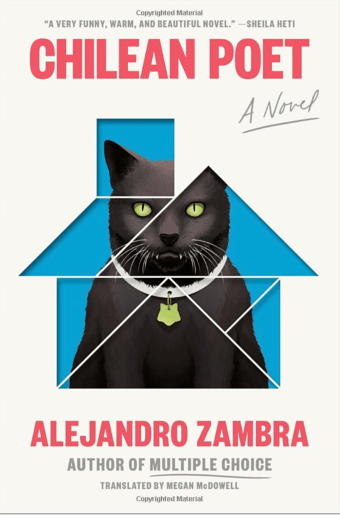Book Review | ‘Chilean Poet’ by Alejandro Zambra, Translated by Megan McDowell
The Bonds of Poetry Create an Entertaining Work of Fiction

Discovering a new author is one of the unparalleled joys of reading. Like the box of chocolates made famous by Forrest Gump, one never knows how a book by a writer unknown to them will resonate, if at all. Will the book be a delight or a disappointment? I discovered Alejandro Zambra on a prospecting journey in the Book Den in Santa Barbara. When I saw the title Chilean Poet, my first thought was of Pablo Neruda, the only Chilean poet I was remotely familiar with. That’s no longer the case, thanks to Zambra, a Chilean poet, short-story writer, and novelist with a number of books to his credit. Chilean Poet was translated by the National Book Award–winning translator Megan McDowell.
At the outset, the novel follows a trio of characters. Gonzalo, an aspiring poet and academic; Carla, an upper-middle-class woman; and her son, Vicente. When we first encounter Gonzalo and Carla, they are teenagers, experimenting with sex under a blanket on a sofa in Carla’s house. Gonzalo is nerdy and inexperienced, but totally smitten, while Carla is cagey, more than happy to fool around under the blanket, certain it will never amount to much more.
They eventually go their separate ways only to meet by chance in a bar some years later. By this time, Gonzalo is teaching and Carla has married, had Vicente, and gotten divorced. They reunite and become a family. Vicente is 6 years old, and Gonzalo takes to the boy and his role as stepfather. Family life isn’t without difficulty — Carla is somewhat domineering, and Gonzalo experiences the uncertainty that comes with being a step-parent — but the relationship works for several years, and even plods along after Carla has a miscarriage. But when Gonzalo accepts a teaching position in New York without telling Carla in advance, they split again, this time for good.
Vicente is a young man of 18 when we meet him again, a bit adrift, searching for a path; he loves poetry and moves in a social circle with others of similar bent. He rarely responds to the occasional messages he receives from Gonzalo. When Vicente has a chance meeting with Pru, a blonde American freelance writer a dozen years his senior, herself at loose ends due to a bad breakup back in New York, he convinces her to write about Chilean poets. Vicente provides an introduction or two that launches Pru on her way; she interviews poets young and old, known and obscure, male and female. One poet tells her that “being a Chilean poet is like being a Peruvian chef or a Brazilian soccer player or a Venezuelan model.”
Pru finds the rarified ground that poets occupy in Chilean society mystifying. Some are more famous than fiction writers; others are extremely competitive and opinionated, often catty; and a few seem perfectly suited to lead a sect or run for political office. They are voluble talkers and regard themselves as avatars of revolution or salvation. Everyone gives Pru their books, in the same manner business people hand out their cards. The world of Chilean poets is a little less classist than Chilean society at large, but only a little. It’s also sexist.
In the last part of the novel, Gonzalo and Vicente are reunited. They meet and talk about poetry and the single book of poems Gonzalo published years before, which he dedicated to Carla and Vicente. Their relationship is of a totally altered character now. Gonzalo is back in Santiago for good, but he has stopped writing and no longer considers himself a poet. He’s more interested in Vicente’s poems and encourages him to read them. Their meeting becomes an extended evening of bar-hopping and discussion that both realize might be the best they can expect from one another. Poetry bonds them more than the half dozen years they lived under the same roof.
The end of the novel is surprising and clever and struck me as the ideal way to bring a delightfully warmhearted and entertaining read to a close.
This review originally appeared in the California Review of Books




You must be logged in to post a comment.